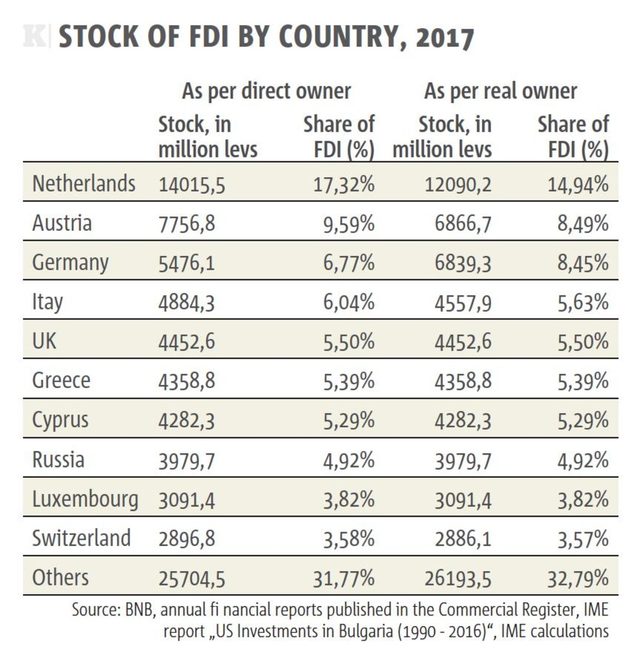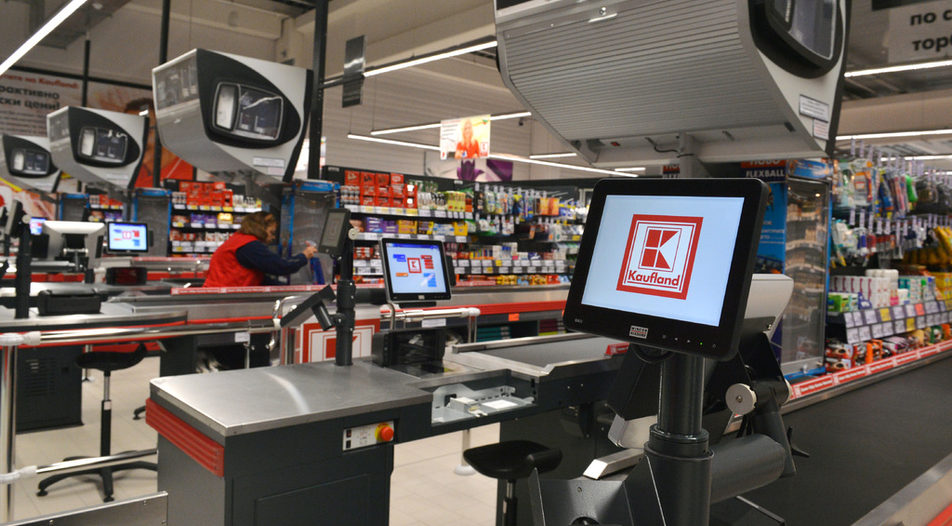While Germany is mostly famed for manufacturing, when it comes to investment in Bulgaria, its most visible presence is in retail - Kaufland, Lidl, Billa, Metro and dm have become household names over the past 20 years and their local subsidiaries are among the biggest companies in terms of revenue.
Apart from retail, with significant investments in the manufacturing sector and to a lesser extent in the financial sector, Germany is the second-largest investor in Bulgaria. On 31 December 2017, 6.5 billion levs, or 8.49% of all foreign direct investment (FDI) stock in Bulgaria, had German origin, surpassed only by investors registered in the Netherlands.
Given its significant share in FDI, investors from Germany can be regarded as a vital part of Bulgaria's economic engine, as FDI and exports have been the two main drivers of Bulgarian economic growth. During 2006-2008, foreign investments reached 23% of GDP, propelling Bulgaria's annual real economic growth to about 7% on average. When the inflow of FDI declined to around 3.5% of GDP on average in 2012-2014, real economic growth shrank to about 1%.
Germany's hidden might
Officially, Germany's share in FDI is only 6.8% due to the applied methodology by the Bulgarian National Bank which identifies foreign investment only according to the direct ownership of capital as opposed to the nationality of the ultimate owner. Such an approach skews the FDI statistics in favour of countries offering convenient business registration and tax regimes like the Netherlands or Cyprus.
In addition, some German companies use their regional subsidiaries to enter Bulgaria's market, thus increasing the share of Austria's or Italy's FDI in the Bulgarian economy. Thus some investments that are currently classified as originating in Austria, for example, have their final ownership in Germany. This is most often seen in the mining, manufacturing, commerce and financial services sectors, which represent about 95% of all German investments in the country.
A total of 127 companies have been identified as having a direct or indirect final owner based in Germany, according to data from the BNB, the National Statistical Institute, the government's Invest Bulgaria Agency, the annual financial statements of the companies published in the Commercial Register and information on the members of the German-Bulgarian Chamber of Industry and Commerce, as well as the TOP 1500 ranking of the Bulgarian Chamber of Commerce and Industry.
The results of this study show that official statistics underestimate German investment in Bulgaria by about 25% or close to 1.4 billion levs.
Almost 66% of all indirect German investments covered by this study enter Bulgaria via companies registered in Austria. Italy is another country through which a significant share of indirect German investment flows into Bulgaria - 24%, while the Netherlands ranks third with about 10%.
Where investments go
Retail trade attracts the largest share of German investment in Bulgaria - 43%. Kaufland, Lidl and Metro, as well as pharmaceutical companies such as Phoenix Pharma, are the most notable examples.
Manufacturing is second with just over 42% of FDI from Germany. The largest investors in this sector include Aurubis Bulgaria, Devnya Cement, Liebherr-Hausgerate Marica, Kaolin-Quarzwerke, Behr-Hella Thermocontrol and Knauf Bulgaria. Most German investments in the sector are in raw materials processing.
Finance and insurance, with 9.3% of all German investments in Bulgaria, is the third (still relatively large) sector preferred by investors from that country. Despite the relatively smaller percentage of German investments in the sector, it should be noted that it was contributed by only two companies - Allianz Bulgaria Holding and ProCredit Bank.
While 98% of all German FDI is concentrated in these three sectors, only 48% of total FDI in Bulgaria is directed to them. In other words, there is some concentration in terms of the sectors of the country's economy preferred by German investors.
The share of German investment in total foreign direct investment in trade and manufacturing sectors is also significant. For example, over 14% of all FDI in the sector of Wholesale and Retail Trade, nearly 11% of Repair of Motor Vehicles and Motorcycles and nearly 11% of Manufacturing come from companies with ultimate German owners, according to IME's estimates. Although the percentages may seem small, it should be noted that these sectors are among those attracting the largest portion of foreign direct investment in Bulgaria.
German FDI's impact on the Bulgarian economy
German companies owned just over 2.7% of total fixed tangible assets in the Bulgarian economy at the end of 2017, or almost 3.4 billion levs. At the same time, German companies provided jobs to more than 1.6% of all employees in Bulgaria or just over 35,000 people. Companies with German end-owners generated more than 4% of all net revenues in the economy in 2017.
In absolute terms, German retailers collectively hold fixed tangible assets worth more than 1.9 billion levs and provide jobs to nearly 19,000 people. The leader in the sector - Kaufland, employs nearly 6,000 people, while Metro and Lidl employ more than 2,000 each.
Although Germany's share in manufacturing industry appears relatively small, German manufacturing plants play a pivotal role in several regions. For example, Aurubis' copper production plant contributes greatly to the economy of the entire Sofia Region.
German-owned IT firms employ 1.3% of the total workforce in this sector of Bulgaria's economy. Most of those employees work for one of the most significant players in the Bulgarian information technology market - SAP, as well as in several medium-sized enterprises.
Companies in the financial sector account for 2% of the fixed tangible assets and 3% of the net revenue generated by German-owned investors. Thanks to their wide branch network, however, they provide jobs to 5% of all Bulgarian employees of German-owned companies.
As expected, the largest number of companies with the most diverse profile are clustered in the capital Sofia, ranging from commercial, industrial and construction to ICT companies. German-owned companies form a significant part of Sofia's economy, as they account for over 3% of net revenue and fixed tangible assets, 3.1% of employment and nearly 7.5% of foreign investment. The reason for the relatively smaller share in employment is probably because most companies in the capital are engaged in activities with high value-added per employee.
An interesting case is the wider Sofia Region, where the influence of German investments is most significant. German companies were responsible for more than a quarter of fixed tangible assets, a third of net revenue and over half of the foreign direct investment in 2017. Although just 6 German companies invest in the wider Sofia Region, they are among the largest.
Another case deserving attention is the Rousse Region, in north-eastern Bulgaria, where most German investment is concentrated in two major companies - Kaolin (part of Quarzwerke Group) and Witte Automotive auto parts maker. Together, they account for more than half of the total foreign direct investment in the region.
The situation is similar in the regions of Varna and Gabrovo, where several large industrial enterprises with German participation (Hamberger Bulgaria, Impuls, and Devnya Cement) have a strong influence on the size and structure of foreign investments. In the case of the coastal region of Varna, the airport management company Fraport, which currently operates Varna Airport, is also worth mentioning.
Many German companies are present in the Plovdiv Region, especially thanks to one of the biggest employers and largest industrial enterprises in Bulgaria, Liebherr (refrigeration), along with a dozen smaller companies including Steca Elektronik, Winterhalder Bulgaria and DB Kunststofftechnik.
*The study has been commissioned by the German-Bulgarian Chamber of Industry and Commerce (AHK Bulgarien)

While Germany is mostly famed for manufacturing, when it comes to investment in Bulgaria, its most visible presence is in retail - Kaufland, Lidl, Billa, Metro and dm have become household names over the past 20 years and their local subsidiaries are among the biggest companies in terms of revenue.
Apart from retail, with significant investments in the manufacturing sector and to a lesser extent in the financial sector, Germany is the second-largest investor in Bulgaria. On 31 December 2017, 6.5 billion levs, or 8.49% of all foreign direct investment (FDI) stock in Bulgaria, had German origin, surpassed only by investors registered in the Netherlands.












